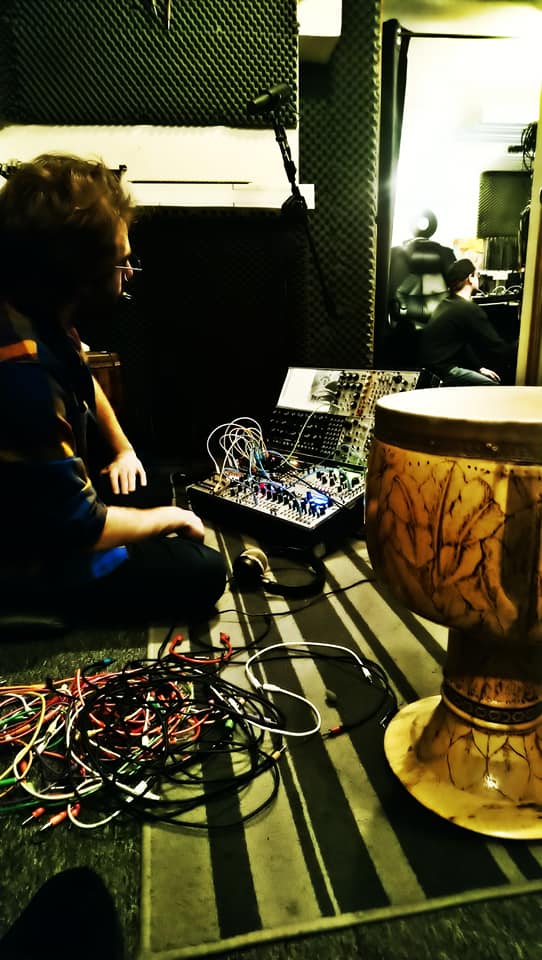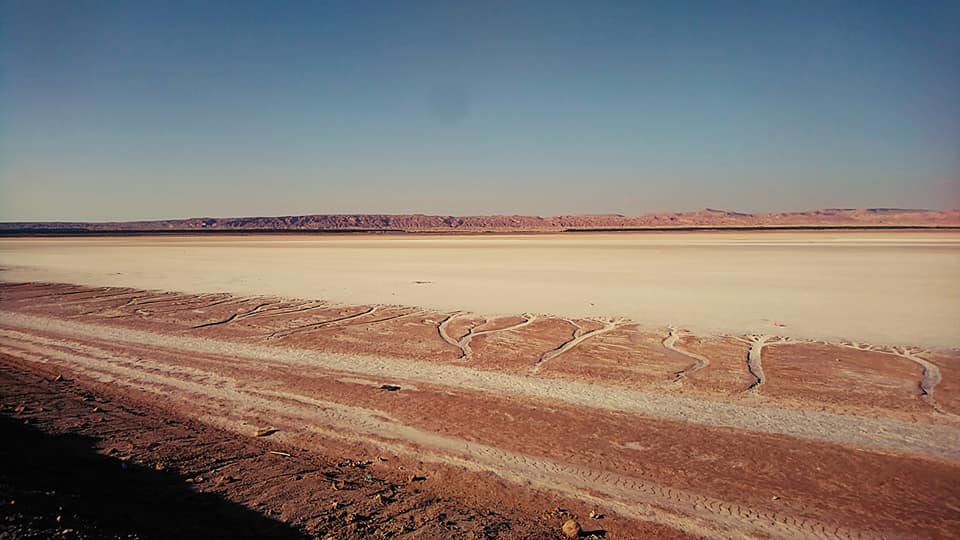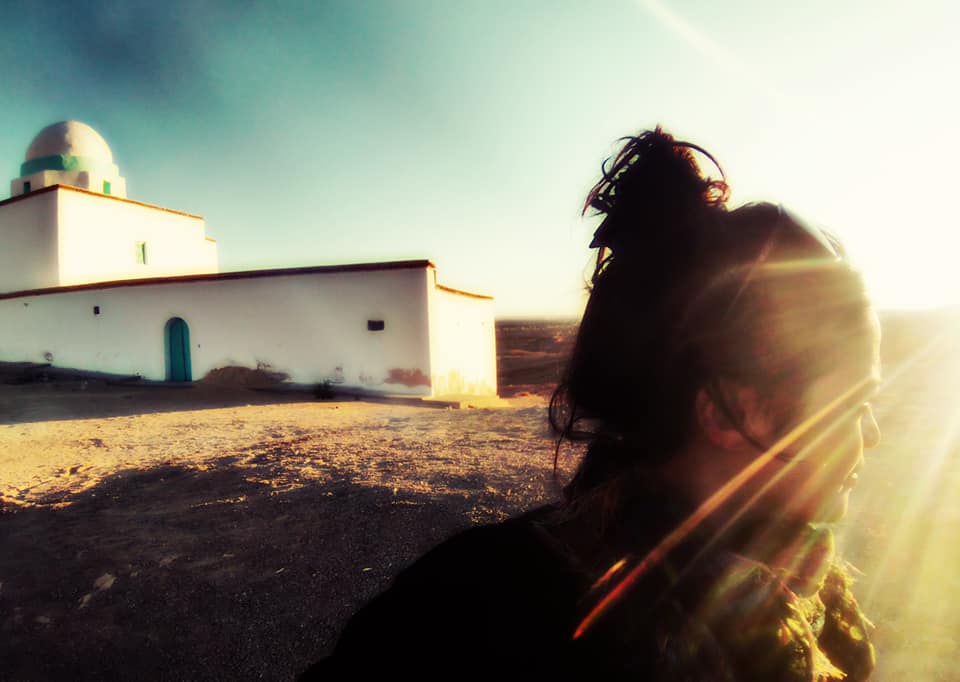“Magnetic Service”, the new EP by Azu Tiwaline at Livity Sound
With the release of her Magnetic Service EP on July 3 on the famous English label Livity Sound, Franco-Tunisian producer Azu Tiwaline once again pushes the boundaries between Dub, Techno and the burning rhythms of her beloved Sahara. Four incredibly effective tracks, including two duets with Parisian singer Cinna Peyghamy, who accompanies her here on percussion. The Tunisian artist lets us hear a detailed sound design work serving arrangements of organic depth with voluptuous bass and subtle tonal touches. Moments before this sonic treasure is revealed to the public, we took the time to talk with her about the desert, revolt and polyrhythms.
Tim Karbon for Couvre x Chefs | Bass Music aficionados (and beyond) got to know you for your work produced under the alias Loan, in a Grime, Dubstep and Breakbeat style, especially with releases on the Marseille label I.O.T. Records. What is the sound aesthetic at the heart of this new alias Azu Tiwaline?
Azu Tiwaline | I’ve always navigated between several musical styles, all of them a bit dark, let’s be honest (laughs) So finally, what could define a musical universe when it is multiple? The moment I started to think about the idea of developing a project under another alias, I asked myself this question and the answer was obvious. To build a new sound identity, I had to start by giving up all my usual production tools and looking for a new sound. It’s not so much in the style that the difference would be made, but rather in the way it sounds. Something that would be more organic, less in sound synthesis, rawer and less smooth, more hypnotic, less in constant ruptures.
When you come from the Dubstep / Grime scene, you might as well say that you are completely obsessed with the quality of the production.
Azu Tiwaline
After a while, you feel like you’re becoming an orthopaedic surgeon looking for the snare that would snap the most monstrously. I think I had reached a stage where I had enough confidence in myself to abandon this side, which was ultimately quite technical, to be able to focus only on the essence of what inspires me: the trance music, the spaces, silence, hypnotic rhythms, emotions, feelings…
How did you come to collaborate with the percussionist Cinna Peyghamy (aka Cikkun) on this EP for Livity Sound? And above all, how was the fusion of your two musical writings implemented on the tracks “Magnetic Service” and “Tight Wind”?
I discovered Cikkun when his EP Injonctions which was released on the Exploration Music label. I honestly think the whole universe has missed this record (laughs) It’s a gem for me! Timeless, creaky, incisive, deep, and what a sound…. damn, THIS SOUND! At the time, I didn’t know that he was developing another project under his name Cinna Peyghamy, a little more experimental and perceived (tombaks). A few years later, I was booked in Paris and saw that he was playing the same evening. I’m rushing to get there. When I arrived, completely out of breath, I sat down and saw his concert. And I remain stuck. At the end of the live I went to see him and I introduce myself by telling him that he has no choice: we will make sound together (laughs). In reality, I was a little more subtle than that, but deep down, I knew it was on!

Then I went back to Tunisia to work on some ideas. After returning to Paris, I took the opportunity to ask him to come over to my studio for a first “musical” contact, just to record sound material to see, listen, test how it all mixes up. And finally, this first session was so rich and brilliant that from there, I was able to immediately produce tracks, including those of the Magnetic Service EP.
You recently gave us a long format called Draw Me A Silence, in the form of two digital EPs released respectively in March and April, then in vinyl format in May, both on I.O.T. Records. Could you tell us more about the musical colour that you deployed with this album?
The writing of this album was done during a very chaotic and painful period of my life. I started to write it when I decided to leave everything to live as close as possible to my roots, in the Tunisian Sahara. Everything there is soft, calm, luminous and mystical. The traditional trance music is still very present, with in particular the Stambeli, which is a ritual that heals and free the mind. It finds its roots in sub-Saharan Africa and has since been diluted in Islam. In Morocco, it is called Gnawa, in Algeria, Diwan.
The idea was to let myself be impregnated by all this musical culture of North Africa and to reinterpret it in larger spaces, with more contemporary textures, in a softer and more relaxed way. In more simplified terms, it is a mixture of polyrhythmic dub and hypnotic techno which uses a lot of traditional sounds but also from recordings collected in the natural environment. The wind, the song of the birds, the sound of the water when the palm groves are irrigated, the insects who find a peaceful place to swarm there, the call to prayer of the mosques around, the cacophony of the souk on Sunday …. The inspiration that came naturally was thanks to the energies of this place, and certainly also due to the call of the Ancestors.
You live half of the year in France and the other half in the Tunisian Sahara. How does this geographic duality affect the way you produce and think music?
The environment in which I live has a huge impact on how I produce. And I’m lucky to be able to live in a calm environment and in the middle of nature, whether it is in Tunisia or in France. I never managed to be a city girl. Being locked in a box or between four walls when you tend to cogitate all the time (area in which I excel) is a guaranteed nightmare ! (laughs)
Some time ago, I foolishly told myself that I would make “Azu Tiwaline” in Tunisia and “Loan” in France. Except it doesn’t work like that ! It’s not just because I live in the desert that this new sound identity came. Certainly, that has contributed greatly. But it’s mainly because I’ve changed, too, I think. I needed to reinvent myself to find meaning and a new rhythm in my life. And my music is my intimate mirror.

Livity Sound is known for being a label that tirelessly pushes the boundaries between Techno, low frequencies and polyrhythmic music, since its foundation by Asusu, Kowton and Peverelist in the early 2010s. Your “Magnetic Service EP” is in the aura of their hybrid approach, at the crossroads between these different approaches to the electronic spectrum. How did you come out with this project with them?
I always dreamed of releasing a record on an English label. I don’t know how to explain this simply without sounding like a groupie) But yes, I am a FAN of many English labels, even almost only labels from Bristol, including Livity Sound.
One day in March 2020, we celebrate the end of the shooting of my clip Omok. I was exhausted, but super happy with the work accomplished. We had a few drinks, what a party it was (laughs) There are days like that, you feel like a superhero. Before going to bed, I say to myself “what if I send my new tracks to a label that I love? “I don’t think long and come up with the idea of sending this project to Livity Sound. It seemed to me to be the ideal label and the most inclined to like this EP. So I’m not even trying to send my tracks to other labels (however, there were a few others on my “gold list”). I send an email and go to bed. The next day, I had an answer in my mailbox and the rest, we know it (laughs) We just had to dare in fact! And then the alignment of the planets must have been pretty good for me that day.
Besides your production and composition work, you are also a live artist and an experienced DJ. How do you connect these two levels of your musical approach, and what part do you leave to improvisation in your sets?
Funny, I never thought about it…. Maybe because everything was done at the same time and naturally? However I would not say that I am an “experienced DJ” since up to now, I have always performed live. I started with that and then I started producing tracks. So for me production and live are intrinsically linked. It turns out that I also knew how to mix for a long time and that I love it! But until now, I would rather perform live. Something that has also changed because today my favorite thing is to mix the two: working on hybrid sets with live and mix.
For me production and live are intrinsically linked.
Azu Tiwaline
In general, I know exactly what I am going to play in a party or an event. I try beforehand to know at what time I am booked, who plays before or after me, for which public, etc … It helps me to prepare something which is in adequacy with this moment. But I always have one or two other emergency sets whith me just in case I completely got the vibe wrong (laughs) And during the live there yes I have to improvise, especially with the way I play each element, how it is brought into the flow, its evolution over time … But all of this is thought out precisely to the extent that I repeat and train a lot before each set. I never arrive with a blank page on stage. Besides, the only times when I really improvise is when I play with someone. When you do a jam there, yes, it has to be, it’s the very principle! It often gives great stuff, a nice mess too, but it’s alive, full of happy and surprising accidents. I love it even if it’s a mess! (laughs)
Let’s go a little outside the musical field. The whole world is currently experiencing great political, health and cultural chaos, amplified by the global epidemic of COVID-19. In France, the pandemic has rekindled social tensions due to the differences in treatment-experienced by the most precarious populations faced with the pandemic, which have been extensively documented since.
More and more voices are being heard, however, for more social and ecological justice, a better distribution of wealth everywhere on the planet, as well as for the indispensable fight against systemic and institutional racism (cf. recent caregivers and those against police violence carried out by the collective Vérité et Justice Pour Adama in Paris, and everywhere in France).
Could you share some of your thoughts on this climate of revolt that we all feel?
Honestly, I don’t see the difference between yesterday and today. Yes on a regular basis, there is a “revolt” or I would rather say a “rant” because, in a desperately cyclical way, everyone returns to a “normal” life after a while (even if it happens far too quickly to my taste). But for those concerned, by all these injustices and this general indifference, revolt is an everyday thing! For me, there is no “climate of revolt” when just certain voices at a certain time make themselves heard more because it is publicized, and that is the subject of the moment.
For justice done to certain people, how many will never be considered?
Azu Tiwaline
But of course, I am not saying that it is useless to revolt, quite the contrary. Obviously there has to be such protest movements to make things happen. Discussions, debates … But I find it so slow to come … We need strongly more demanding actions if we want to talk about revolt. You can’t imagine how deeply it touches me to see how people can be considered, including me, all because of a skin color, a male / female gender, different origins or cultures, of a sexual orientation, of a social level… When I see someone suffering, it also hurts me. When we look at the news, all this violence, these unjust deaths, the distress and the grief of the relatives of the victims… While some people feel anger rising towardq – for example – police violence or at least the “culprits” ‘s actions, I in the other hand, cannot help thinking only about the suffering of the victims. And I cry like a kid. I’d rather protect myself from these “publicized” news items. I don’t watch the news, I avoid the atrocious documentaries and reports, reading is enough for me to inform myself, if necessary and when it is necessary. The shock from all these images is immense. I prefer to continue to believe in humanity, all that is good in it, to consider that I am a human, and that in the lot of all these humans, there are good people, and also very stupid people. Living together is an everyday lesson. No matter what we call “evolution,” I won’t change the world, but I can change the way I see it to be a little more at peace with it.
With the end of public performances, the closing of the halls, the cancellation of festivals and concerts since the confinement of last March, musicians, DJs, technicians, bookers and labels found themselves roughed up. and almost incapable of exercising their professions with dignity (with all the health risks involved ).
Some artists such as your label colleague Simo Cell, want to take advantage of this moment of forced reflection to rethink the DJ status & live artists, and the ways of performing in a musical field still too much governed by the policy of the offer and the absence of real ecological measures (see a note written by the producer and DJ for Liberation last June).
In your opinion, how should we rethink the galaxy of electronic music by following this line of reflection? And on what scale, as an activist of these kinds of music, do you think that we can make a paradigm shift?
I find all these reflections very interesting and useful for this environment and those who are concerned. It’s a very positive signal for the future. Personally, I have so little succeeded in “living” on my music (even if I do not like this expression) that I don’t think it is relevant that I as myself those questions ! (laughs) When I go to a city to play, I immediately think of the record stores where I will be able to go dig and the great food of the local cuisine that I will eat (laughs) You add to that the touristic places to go to and in the end, it’s not a gig anymore that I’m going to do, it’s a discovery trip on the pretext that I have a gig (laughs) But yes, just for laughs, let’s imagine for a moment that I have a life of an overbooked artist… Well it would be the same in fact, even worse since I might have more reasons to dig and more opportunities to try new cuisine (laughs)
Thank you for taking the time to discuss with us all these questions. Last but not least: do you have future sonic and musical projects or desires that you would like to share with us?
So I have lots of ongoing projects. But I’m super superstitious so I don’t like to talk about it until it has started (laughs) The one I can reveal is a track on a superb compilation “Door to the Cosmos” on the English label On The Corner Records in September with a title in collaboration with Cinna Peyghamy entitled “Violet Curves”. With great artists such as Dengue Dengue Dengue, Nicola Cruz, DJ Khalab, Afrikan Sciences…
Later this year, we’re going to release an EP of remixes from my album “Draw Me A Silence” with producers that I really like. Still on I.O.T Records, of course! And I am also currently finishing an EP for another UK label whose name I will not mention for now!
Thanks to you, Tim, it was so cool to do this interview with friends! And thanks to Couvre x Chefs for the invitation!
Magnetic Service EP by Azu Tiwaline is available on Bandcamp.

